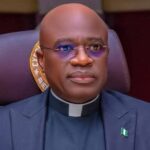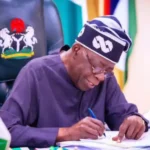The South-South, consisting of Akwa Ibom, Bayelsa, Cross River, Delta, Edo, and Rivers States, has long been at the centre of Nigeria’s economic growth due to its oil wealth.
Yet, paradoxically, it has remained one of the most underdeveloped regions in terms of infrastructure, human capital, and social welfare.
President of the Senate, Godswill Akpabio, including other senators from the region, recognised these flaws and advocated for a commission through a bill sponsored by Senator Asuquo Ekpenyong (Cross River South) that would cater exclusively to the South-South’s unique needs. With President Tinubu’s signature, their vision has now become law.

The recent enactment of the South-South Development Commission Bill signifies a crucial turning point. This change stems from the legislative insight of the Senate, bipartisan commitment, and a transformative agenda from the presidency. The commission represents more than just a bureaucratic body—it is a vital support system for a region facing environmental degradation and economic stagnation.
The Pan Niger Delta Forum (PANDEF), including several stakeholders, has hailed the commission’s establishment, urging President Tinubu to appoint leaders with “cognate skills” to ensure accountability. President Tinubu’s assent to the bill reflects his administration’s resolve to decentralise development. By approving regional commissions for the South-West, South-East, and now South-South, he has signalled a shift toward inclusive governance. This aligns with his broader agenda to empower regions, ensuring no zone is left behind.
The newly established commission offers a blueprint for reversing these trends. By prioritising geopolitical equity over oil-dependent allocations, Cross River and other South-South states will receive resources commensurate with their needs. Through funding from partnerships and allocations, the commission can address oil spills, gas flaring, and erosion. For example, Cross River’s flood-prone communities could see drainage systems and coastal barriers, safeguarding lives and livelihoods.
President of the Senate, Godswill Akpabio’s leadership has been instrumental in advancing regional development. His dogged efforts in getting the bill signed into law cannot be overstated. His advocacy for grassroots-focused policies, including creating the other 4 regional commission, underscores his commitment to equity.
The South-South’s ecological challenges are both dire and multifaceted. Coastal erosion, oil spills, gas flaring, and flooding threaten communities in Cross River, where limestone-rich soils dissolve into rivers, displacing families. In Edo, gullies over 50 feet deep scar landscapes, while oil pollution chokes ecosystems. The East-West Road, a lifeline connecting six states, still needs massive investment, and a new developmental model should be welcomed.
Senator Asuquo Ekpenyong’s role as the bill’s architect is worthy of commendation. By championing geopolitical equity and bypassing the NDDC’s quantum of oil production funding allocation model, he ensured that states in the region with comparatively lesser oil production would no longer be marginalized. His emphasis on equitable infrastructure development resonates across communities in the south south region.

















Leave a comment